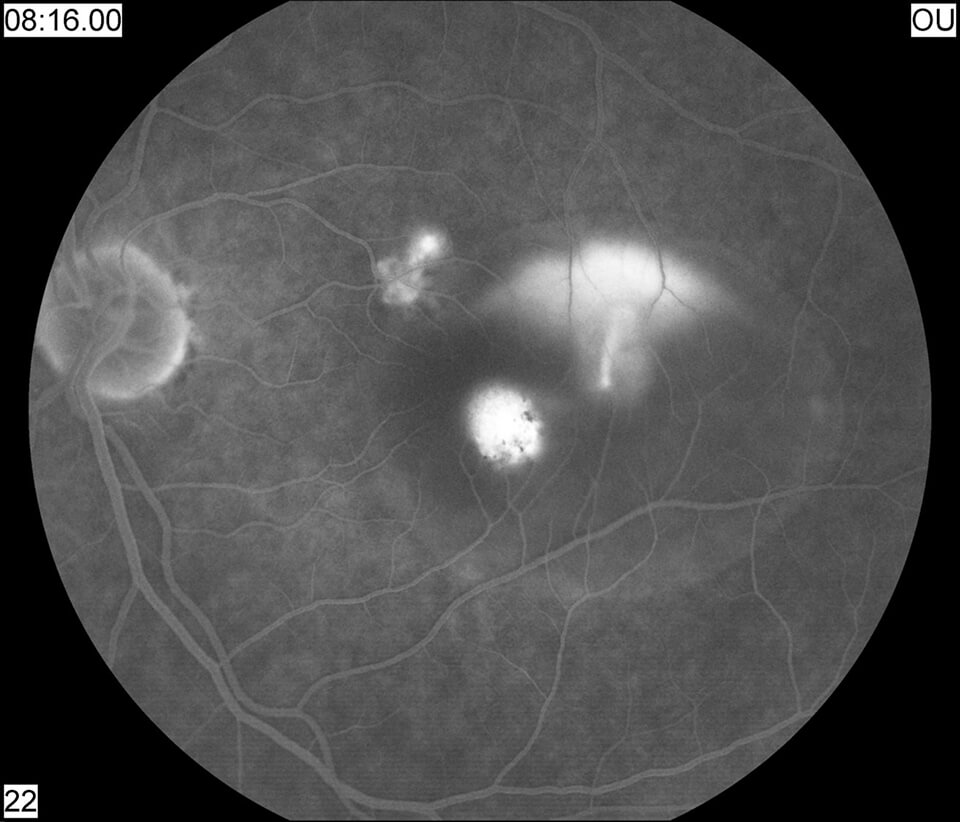Central Serous Retinopathy
What is central serous retinopathy?
Central serous retinopathy (CSR) is a condition of unknown cause in which fluid accumulates underneath the retina in the central macula. This leads to distortion and blurred vision. Most patients with CSR are males in their third and fourth decades. Stress or corticosteroid use may play roles in inciting or aggravation the condition. After the age of 50 or 55, the diagnosis is more difficult to make as there is a certain degree of overlap with age-related macular degeneration. We have seen patients who presented with very typical central serous retinopathy who then later evolved to age-related macular degeneration, so the prognosis in older patients is somewhat different than younger or middle-aged patients.
What causes central serous retinopathy?
Central serous retinopathy (CSR) is a condition of unknown cause, in which leakage of fluid develops under the macula, leading to a disturbance in central vision. CSR generally occurs in adults in their 30’s and 40’s and is more common in men than women. Corticosteroid medications and psychological stress may trigger or exacerbate episodes of CSR.
Central Serous Retinopathy Symptoms
The most common symptoms of CSR are a dim spot in the center of vision, blurred vision, and distorted vision. Objects may also appear smaller when viewed with the affected eye.
How is CSR diagnosed?
Fluorescein angiography is a common test that can substantiate the diagnosis of CSR. In this test, the doctor injects an orange dye into the patient’s vein and then observes the dye as it circulates through the ocular vasculature. Often, areas of previous retinal pigment epithelial disruption can be visualized elsewhere in the same eye or in the macula of the unaffected eye. Ocular coherence tomography (OCT) is another test that is helpful. This imaging modality can accurately detect fluid and swelling in the retina.
Central Serous Retinopathy Treatment Options

Recovery From CSR Treatment
Many patients will recover vision back to the 20/20 level, however, patients will often report that vision in the affected eye is not quite as good as the normal eye even long after the fluid has resolved. Approximately 25% of patients develop a recurrent episode. Also, there is a subset of patients with significant retinal pigment epithelial abnormalities that are susceptible to attacks in both eyes, often simultaneously. The prognosis in this group is much less optimistic, though with treatment many can maintain reading and driving vision.
Results of CSR Treatment
Central Serous Retinopathy most commonly presents as a one-time event in just one eye and resolves spontaneously without treatment within three to four months. CSR can occasionally occur in both eyes. In some people, it can recur unpredictably months or years after the initial episode has resolved. There is also a less common, severe form of CSR where the fluid accumulation is chronic and fails to resolve without intervention.
What is the expected course of central serous retinopathy?
As shown above, most cases of CSR resolve themselves and patients can recover their vision back to a 20/20 level. This usually occurs within six months. In due time, the patient’s vision improves as the eye heals. There can be a decrease in visual acuity in the affected eye, such as decreased night vision, reduced color discrimination, and localized distortion. There is a chronic form of CSR that occurs in approximately five percent of cases.
Schedule a Consultation
To learn more about diabetic retinopathy, please call (855) 515-2020 to schedule a consultation.
We are proud to serve the communities of Minneapolis/St Paul, Brainerd, Duluth, Glencoe, Mankato, St. Cloud, and more.

